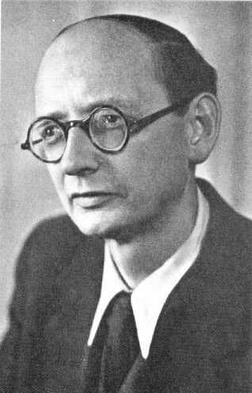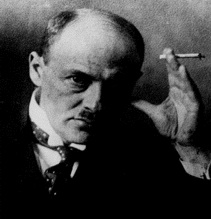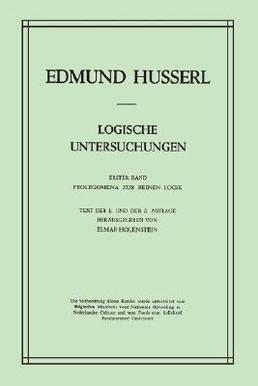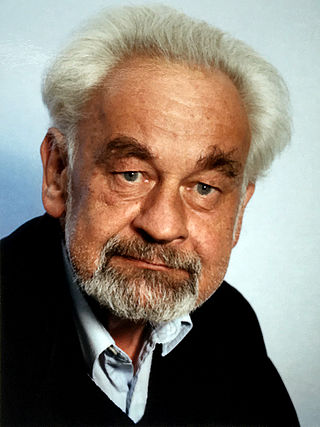Related Research Articles

Edmund Gustav Albrecht Husserl was an Austrian-German philosopher and mathematician who established the school of phenomenology.

Niels Henrik David Bohr was a Danish theoretical physicist who made foundational contributions to understanding atomic structure and quantum theory, for which he received the Nobel Prize in Physics in 1922. Bohr was also a philosopher and a promoter of scientific research.

Phenomenology is a philosophical study and movement largely associated with the early 20th century that seeks to objectively investigate the nature of subjective, conscious experience. It attempts to describe the universal features of consciousness while avoiding assumptions about the external world, aiming to describe phenomena as they appear to the subject, and to explore the meaning and significance of the lived experiences.

Alfred Schutz was an Austrian philosopher and social phenomenologist whose work bridged sociological and phenomenological traditions. Schutz is gradually being recognized as one of the 20th century's leading philosophers of social science. He related Edmund Husserl's work to the social sciences, using it to develop the philosophical foundations of Max Weber's sociology, in his major work Phenomenology of the Social World. However, much of his influence arose from the publication of his Collected Papers in the 1960s.

Max Ferdinand Scheler was a German philosopher known for his work in phenomenology, ethics, and philosophical anthropology. Considered in his lifetime one of the most prominent German philosophers, Scheler developed the philosophical method of Edmund Husserl, the founder of phenomenology.
Adolf Bernhard Philipp Reinach was a German philosopher, phenomenologist from the Munich phenomenology school and law theorist.

Oskar Becker was a German philosopher, logician, mathematician, and historian of mathematics.

Philosophical anthropology, sometimes called anthropological philosophy, is a discipline dealing with questions of metaphysics and phenomenology of the human person.

Helmuth Plessner was a German philosopher and sociologist, and a primary advocate of "philosophical anthropology".
Bracketing means looking at a situation and refraining from judgement and biased opinions to wholly understand an experience. The preliminary step in the philosophical movement of phenomenology is to suspend judgment about the natural world and instead, to focus on analysis of experience. Suspending judgement involves stripping away every connotation and assumption made about an object. Its earliest conception can be traced back to Immanuel Kant who argued that the only reality that one can know is the one each individual experiences in their mind. Edmund Husserl, building on Kant’s ideas, first proposed bracketing in 1913, to help better understand another’s phenomena.

The Accumulation of Capital is the principal book-length work of Rosa Luxemburg, first published in 1913, and the only work Luxemburg published on economics during her lifetime.
Moritz Geiger was a German philosopher and a disciple of Edmund Husserl. He was a member of the Munich phenomenological school. Beside phenomenology, he dedicated himself to psychology, epistemology and aesthetics.

Max Scheler (1874–1928) was an early 20th-century German Continental philosopher in the phenomenological tradition. Scheler's style of phenomenology has been described by some scholars as “applied phenomenology”: an appeal to facts or “things in themselves” as always furnishing a descriptive basis for speculative philosophical concepts. One key source of just such a pattern of facts is expressed in Scheler’s descriptive mapping of human emotional life as articulated in his seminal 1913–1916 work, Formalism in Ethics and Non-Formal Ethics of Values.
Christian Lotz is a German-American professor of philosophy at Michigan State University. Lotz's work primarily focuses on 19th and 20th Century European philosophy, continental aesthetics, critical theory, Marxism, and contemporary European political philosophy.

The Logical Investigations is a two-volume work by the philosopher Edmund Husserl, in which the author discusses the philosophy of logic and criticizes psychologism, the view that logic is based on psychology.
Early phenomenology refers to the early phase of the phenomenological movement, from the 1890s until the Second World War. The figures associated with the early phenomenology are Edmund Husserl and his followers and students, particularly the members of the Göttingen and Munich Circles, as well as a number of other students of Carl Stumpf and Theodor Lipps, and excludes the later existential phenomenology inspired by Martin Heidegger. Early phenomenology can be divided into two theoretical camps: realist phenomenology, and transcendental or constitutive phenomenology.

Thomas Seebohm was a phenomenological philosopher whose wide-ranging interests included, among others, Immanuel Kant, Edmund Husserl, hermeneutics, and logic. Other areas of Professor Seebohm's interests included the history of philosophy, philosophy of history, philosophy of the formal sciences, methodology and philosophy of the human sciences, the history of 19th century British Empiricism, American pragmatism, analytic philosophy, philosophy of law and practical philosophy, and the development of the history of philosophy in Eastern Europe. Despite this diverse span of interests, Seebohm was chiefly known as a phenomenologist, who "above all...considered himself a creative phenomenologist, who as a critically reflecting philosopher would look at all major issues with which he became confronted, from a transcendental phenomenological point of view."
Manfred S. Frings was a scholar of philosophy, a professor, and the editor of the German editions of Heidegger Gesamtausgabe and Max Scheler's works. He was known as the world's leading specialist in the philosophy of Max Scheler, he published over one hundred articles, and edited twenty-four books. He wrote The Mind of Max Scheler: The First Comprehensive Guide Based on the Complete Works, as well as the forward to Pope John Paul II's book, Primat des Geistes.
In philosophy, axiological ethics is concerned with the values by which people uphold ethical standards, and the investigation and development of theories of ethical behaviour. Axiological ethics investigates and questions what the intellectual bases for a system of values. Axiologic ethics explore the justifications for value systems, and examine if there exists an objective justification, beyond arbitrary personal preference, for the existence and practise of a given value system. Moreover, although axiological ethics are a subfield of Ethical philosophy, axiological investigation usually includes epistemology and the value theory.
Elmar Holenstein is a Swiss philosopher with research interests in the fields of philosophical psychology, philosophy of language and cultural philosophy.
References
- ↑ Scott, Alex. "Husserl's Ideas on a Pure Phenomenology and on a Phenomenological Philosophy". angelfire. Queequeg's Crossing. Retrieved 30 September 2015.
- ↑ Zur Mechanik des Geistes. OCLC World Cat. OCLC 9903760.
- ↑ "Rosa Luxemburg The Accumulation of Capital". marxists. MIA: Writers: Luxemburg. Retrieved 30 September 2015.
- ↑ "Formalism in Ethics and Non-Formal Ethics of Values Work by Scheler". britannica. Encyclopedia britannica. Retrieved 30 September 2015.
- ↑ Bohr, N. (July 1913). "On the constitution of atoms and molecules". Philosophical Magazine. Series 6. 26 (151): 1–25. doi:10.1080/14786441308634955.
- ↑ "Review". The Cambridge Review. 34 (853): 351. 1913-03-06. Archived from the original on 2006-04-30. Retrieved 6 November 2016.